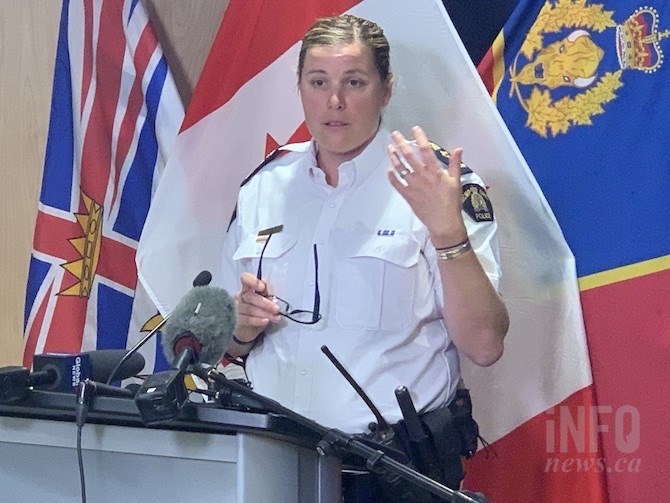
Kelowna RCMP Supt. Kara Triance.
(ROB MUNRO / iNFOnews.ca)
December 14, 2021 - 7:30 AM
People suffering from a mental health crisis in Kelowna – or anywhere else – don’t need the heavy hand of the law coming down on them.
They often need counselling help, addiction services or a social worker instead of police responding to a complaint or a call for help.
“Why have we, as a society, decided that should fall to law enforcement who are trained in the criminal justice system?” Kelowna RCMP Supt. Kara Triance asked during an interview with iNFOnews.ca. “They’re trained in the use of force.
“Would it not more appropriately sit with social workers and nurses who have medical degrees equipped to deal with the complexities of addiction and brain damage? Should we be looking at a different tier of response model within our province and be able to address people in crisis with mental health issues and move away from criminalizing mental health issues within our community? I truly believe that is a societal fast forward for decision-makers at a provincial level.”
Triance has now completed her first year at the helm of the Kelowna detachment where, amongst many other matters, she inherited the legacy of the Mona Wang incident.
Wang’s boyfriend called the RCMP for a wellness check on her in January 2020. RCMP Const. Lacey Browning responded and ended up dragging Wang down the hallway of her student residence building at UBCO.
The incident was caught on video and Browning is now facing criminal assault charges.
READ MORE: Assault charge approved against Kelowna RCMP officer for violent wellness check
Triance doesn’t want any officer attending a wellness check without a trained clinician at their side. She also doesn’t want her officers dealing with mental health issues on the street.
“Let’s get psychiatric and mental health services out onto our streets much like we see in larger centers like Vancouver and Victoria where nurses and social workers and psychiatrists walk the streets and provide those services at the street level to people who are in need,” Triance said.
It also comes down to having those services available inside the detachment when people are brought in.
“Kelowna is the largest cell block in B.C., that I’m aware of, that doesn’t have a full-time nurse in there,” Triance said. “We (RCMP and Interior Health) are looking at whether or not that’s possible. We’re also looking at how to get mental health and addiction services right into our cell block to those who need it at their most impacted and vulnerable times. They’re headed either to incarceration or they’re going to be released on bail terms. Let’s get them those services when they’re at a pretty low moment in their lives and open and ready to receiving it and get them on the pathway to health and wellness that takes them out of the criminal justice system.”
She’s made that pitch to the Special Committee on Reforming the Police Act but says the Mental Health Act also needs to be reviewed.
Kelowna RCMP do have a Police and Crisis Team, or PACT team that pairs a nurse with a police officer but Interior Health has made it clear it will not fund a second nurse, Triance said. Interior Health is, however, working closely with the RCMP to try to find other ways to help ease the burden.
“There are very few files our officers deal with in a day that do not have a mental health component,” Triance said.
Shifting much of that load to Interior Health not only frees up police officers to do the work they’re trained to do but it also makes financial sense for city taxpayers.
“People in crisis in our community, I really believe, would be better served through an alternative means of crisis diversion rather than that call going through to police and ultimately being billed to the municipality,” Triance said. “Municipalities are paying for policing services and your police officers are responding to mental health calls and taking a significant number of mental health calls. I would argue that that needs to be appropriately shifted to a provincial ministry where health care is provincially funded.”
While, ultimately, it’s a provincial decision to make such a fundamental shift, Triance is confident that changes are coming.
“I do believe I’m going to be able to have some impact,” she said. “If I’m advocating for it and I’m speaking of the need for it and presenting the numbers, it’s going to be pretty hard for the province to turn a blind eye to what I say is a critical need in Kelowna right now.”
READ MORE: Crime returning to pre-pandemic levels in Kelowna: RCMP
To contact a reporter for this story, email Rob Munro or call 250-808-0143 or email the editor. You can also submit photos, videos or news tips to the newsroom and be entered to win a monthly prize draw.
We welcome your comments and opinions on our stories but play nice. We won't censor or delete comments unless they contain off-topic statements or links, unnecessary vulgarity, false facts, spam or obviously fake profiles. If you have any concerns about what you see in comments, email the editor in the link above.
News from © iNFOnews, 2021